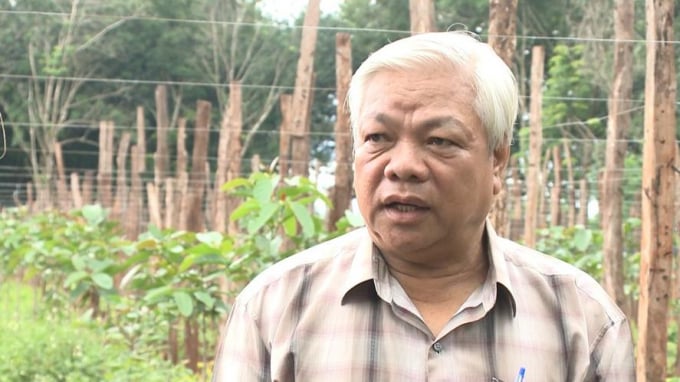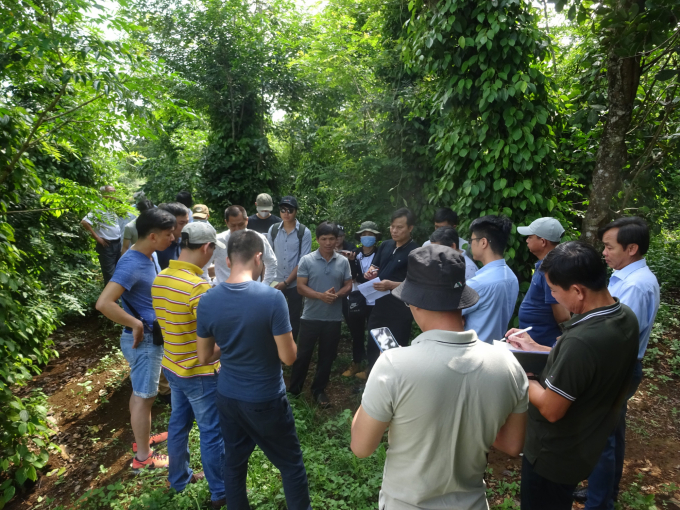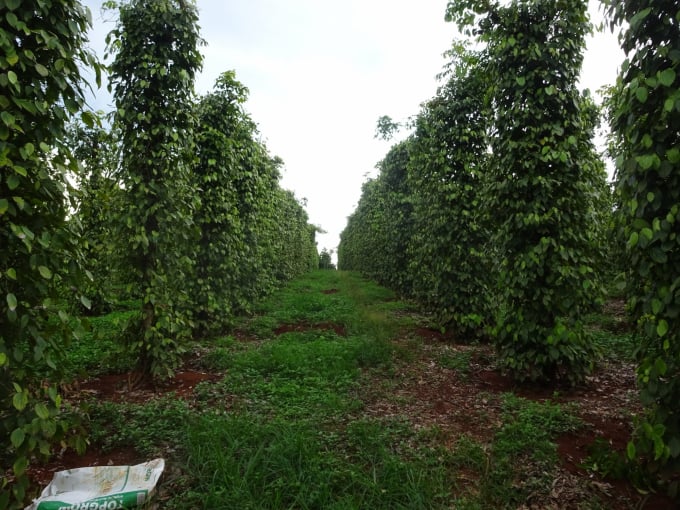May 21, 2025 | 08:33 GMT +7
May 21, 2025 | 08:33 GMT +7
Hotline: 0913.378.918
May 21, 2025 | 08:33 GMT +7
Hotline: 0913.378.918

Hoang Phuoc Binh, Standing Vice Chairman of Chu Se Pepper Association. Photo: DL
What do you think about the development of pepper market over the past time and in the future?
After setting a record high at VND220,000 per kilo in 2015, the prices of pepper were down by tens of thousands of dongs per kilo each year from 2016 to 2020. By the early April 2021 the price hit the bottom at VND34,000 per kilo.
Since then the prices have gradually increased and currently settled at VND70,000. Therefore, the fiscal year 2020-2021 can be described as a period when the prices have hit the bottom then rebounded.
It was estimated there were 153,000 hectare of pepper cultivation nationwide in 2017. By 2021 the productive area was less than a half of the area of 2017.

A training course on sustainable pepper farming methods. Photo: Dang Lam.
While pepper output in 2020-2021 is projected to decrease by 30% to 150,000 tons from 240,000 tons in 2019-2020, according the data of Vietnam Pepper Association. We exported 285,000 tons of pepper in 2020 but the export volume may be around 200,000 tons this year. Particularly in the first five months of 2021, Vietnam exported only over 121,00 tons of peppery, down 17%.
Despite the uptrend in pepper price recently and lucrative pepper farming business the pepper industry remains facing a number of difficulties in the next time such as lower demand driven by global economic crisis due to Covid-19 and supply chain disruption leading to skyrocketing charges for the freights from Vietnam to the Middle East, Europe or the US, up 6-10 times above they used to before Covid-19.
Especially, many enterprises that singed future contracts to sell pepper at lower prices (VND40,000-55,000 per kilo) than the current farm-gate prices (above VND70,000 per kilo) are now bearing a heavy loss. Meanwhile in recent years, many enterprises have decided to buy and store pepper as the supply was abundant and the prices were low. It’s quite likely that it will take a short time to sell out pepper stockpile. Afterward, there may be a short of supply which may trigger a rush to buy raw pepper mostly from Vietnam which accounts for nearly 60% of the world’s pepper export market share.
So I can affirm that from now until the year-end and in the next years, pepper prices are expected to increase and the prices are likely to reach VND90,000-VND100,000 per kilo.

An organic pepper plantation. Photo: Dang Lam.
In the future, to expand pepper cultivation what should we pay attention?
To develop pepper cultivation sustainably, the foremost thing is that the Government and the relevant ministries and agencies need to have accurate and update information about the pepper area in Vietnam in particular and in the world in general as well as the information about the processing, transportation and consumption to develop a suitable strategy for the domestic pepper industry.
Next, the Central Government should design and layout adequate and just-in –time policies to support the development of agricultural products in general and pepper in particular.
Do you have any recommendations to pepper farmers?
As for pepper farming households, they need to have two basic things including the knowledge of pepper farming and market demand and the knowledge of investment and taking care of existing pepper plantations and new pepper –growing areas. They should remember to not replant pepper seedlings into the old pepper plantations where the plants died of diseases. Second, they should choose suitable soil for pepper cultivation and buy high-quality seedlings. Also, the farmers should not remove grass in the pepper gardens and should adopt water-saving technologies in pepper cultivation. In addition, biologically organic fertilizers should be used so that the plants can grow sustainably and are less susceptible to pests and diseases.
However, sustainability should be the top priority for the rebound of pepper industry in the future.
Thank you!
Translated by Mai Tham

(VAN) The trade turnover of agro-forestry-fishery products is growing significantly, along with investment cooperation commitments that are opening up new development directions between Vietnam and Russia.

(VAN) Khanh Hoa is investing over 545 billion VND to develop 240 hectares of high-tech marine aquaculture in order to guarantee a consistent supply of seafood exports and achieve the USD 1 billion target.

(VAN) Minister of Agriculture and Environment Do Duc Duy held a meeting with Soopakij Chearavanont, Chairman of C.P. Group, on May 15.
/2025/05/16/3800-0-nongnghiep-143756.jpg)
(VAN) Suntory PepsiCo Vietnam coordinated with the Ministry of Education and Training to implement an education program on water conservation, reaching nearly 1 million primary school students nationwide.

(VAN) Vietnam’s TH Group officially put its high-tech fresh milk processing plant into operation in the Russian Federation, marking a historic moment as the first TH true MILK cartons were produced in Russia.

(VAN) Use of high-quality broodstock and biotechnology is regarded as the most effective approach to ensuring sustainable and economically viable shrimp aquaculture ahead of climate change and the emergence of increasingly intricate disease patterns.

(VAN) Carbon farming is a form of agricultural practices that helps absorb more greenhouse gases than it emits, through smart management of soil, crops, and livestock.